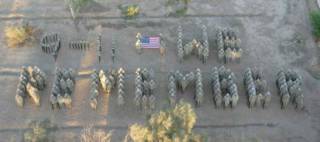The Truth: What Would Happen If We Withdraw From Iraq Before Iraq Is Ready
Losers
By Oliver North

If Senate Majority Leader Harry Reid is right, nearly 60 percent of Americans agree with him that the war in Iraq is already lost. And if he is correct in saying that losing the war will increase Democrat majorities in future elections, then it may be fair to conclude that Americans now love losers. I'm not buying any of it -- and neither are the troops who are fighting this war.
In the days since Reid announced "this war is lost," I have heard from dozens of the soldiers, sailors, airmen, Guardsmen and Marines that I have covered in eight trips to Iraq and two to Afghanistan for FOX News. Some of those who correspond with me are there now, others are home. Some are preparing to deploy again. None of them agree with Reid's assessment.
One e-mail from Ramadi, Iraq observed: "Good thing this guy Reid wasn't around in 1940 when Winston Churchill promised the people of Great Britain nothing but 'blood, toil, tears and sweat.'" Another, a Guardsman who recently returned from Mesopotamia with a Purple Heart, noted that Reid has become "Al Qaeda's most powerful ally." A Marine corporal I last saw along the banks of the Tigris River -- now a Mississippi State University student -- asked me, "Do those people who think we've lost this war have any idea what things will be like if we really do lose?" It's an important question that none of the potentates on the Potomac who just voted to withdraw U.S. troops appear willing to address.
According to military folklore, Napoleon kept a corporal at his side to ensure that the orders issued in battle were understandable by the troops who had to carry them out. Whether true or not, it's time for Reid and Nancy Pelosi to find such a corporal who will ask them such questions, for if the Democrats continue their current course, we may well lose this war -- and they will have embraced defeat and all that comes with it.
What would losing the war in Iraq mean? It's a picture so dark and depressing that it makes the collapse in Vietnam, 32 years ago next week, look like a Sunday school picnic. The fall of Saigon was horrific for the people of Vietnam and their neighbors in Cambodia and Laos. More than 5 million became refugees and by the most conservative estimates at least a million others perished.
For most Americans, the consequences were minimal. The vast majority of the 2.8 million of us who had fought and bled there mourned the loss of 58,253 of our comrades, swallowed the bitterness of defeat and got on with our lives. Our nation spent a few hundred million tax dollars on refugee relief and resettlement, and tried to forget what people in Reid's party called "the long nightmare of Vietnam."
But classified U.S. intelligence assessments, military contingency plans and staff studies evaluating the consequences of a precipitous U.S. withdrawal from Iraq, coupled with the lack of funding for political reform measures, as contained in the legislation just passed by Reid's party, paint a far more dismal picture than anything that happened after Vietnam.
Within months, an immediate upsurge in vicious sectarian violence fomented by Iranian intervention on behalf of Shiite militias and Wahabbi-supported, Al Qaeda-affiliated terror groups. As U.S. forces retreat to a half-dozen staging areas for retrograde through Kuwait and Jordan, American casualties will dramatically increase as suicide bombers seek "martyrdom" in their victory.
Inside of 18 months, the fragile democratically elected government in Baghdad will collapse, precipitating a real sectarian civil war and the creation of Taliban-like "regional governments" that will impose brutal, misogynistic rule throughout the country. The ensuing flood of refuges into Kuwait, Saudi Arabia, Jordan, Syria, Turkey and Iran will overwhelm relief organizations, creating a humanitarian disaster making what's happening in Darfur pale by comparison.
The Kurds in northern Iraq are likely to declare an autonomous region that could well result in Turkish, Iranian and even Syrian military intervention.
In the course of withdrawing U.S. combat brigades and support units, billions of dollars in American military equipment and ordnance will have to be destroyed or left behind. More than $40 billion in reconstruction projects for schools, health-care facilities, sanitation, clean water, electrical distribution and agricultural development will be abandoned. Plans to exploit the new West Qurna oil field in southeastern Iraq will be forsaken.
The governments of Kuwait, Jordan, Abu Dhabi and Bahrain, intimidated by Iranian boldness in acquiring nuclear weapons, will likely insist on the withdrawal of American military bases from their territories. Such a move will jeopardize U.S. naval operations in the Persian Gulf and logistics, intelligence collection and command and control facilities supporting operations in Afghanistan.
As Iraq becomes a battleground for the centuries-long Sunni-Shia conflict, radical Islamic terror organizations will use the territories they control to prepare and launch increasingly deadly terror attacks around the globe against U.S. citizens, businesses and interests.
Reid and his cohorts in Congress who believe "this war is lost" have acted to ensure that it will be. No one asked them: "If we lost, who won?" The answer should be obvious.

Story Here
By Oliver North

If Senate Majority Leader Harry Reid is right, nearly 60 percent of Americans agree with him that the war in Iraq is already lost. And if he is correct in saying that losing the war will increase Democrat majorities in future elections, then it may be fair to conclude that Americans now love losers. I'm not buying any of it -- and neither are the troops who are fighting this war.
In the days since Reid announced "this war is lost," I have heard from dozens of the soldiers, sailors, airmen, Guardsmen and Marines that I have covered in eight trips to Iraq and two to Afghanistan for FOX News. Some of those who correspond with me are there now, others are home. Some are preparing to deploy again. None of them agree with Reid's assessment.
One e-mail from Ramadi, Iraq observed: "Good thing this guy Reid wasn't around in 1940 when Winston Churchill promised the people of Great Britain nothing but 'blood, toil, tears and sweat.'" Another, a Guardsman who recently returned from Mesopotamia with a Purple Heart, noted that Reid has become "Al Qaeda's most powerful ally." A Marine corporal I last saw along the banks of the Tigris River -- now a Mississippi State University student -- asked me, "Do those people who think we've lost this war have any idea what things will be like if we really do lose?" It's an important question that none of the potentates on the Potomac who just voted to withdraw U.S. troops appear willing to address.
According to military folklore, Napoleon kept a corporal at his side to ensure that the orders issued in battle were understandable by the troops who had to carry them out. Whether true or not, it's time for Reid and Nancy Pelosi to find such a corporal who will ask them such questions, for if the Democrats continue their current course, we may well lose this war -- and they will have embraced defeat and all that comes with it.
What would losing the war in Iraq mean? It's a picture so dark and depressing that it makes the collapse in Vietnam, 32 years ago next week, look like a Sunday school picnic. The fall of Saigon was horrific for the people of Vietnam and their neighbors in Cambodia and Laos. More than 5 million became refugees and by the most conservative estimates at least a million others perished.
For most Americans, the consequences were minimal. The vast majority of the 2.8 million of us who had fought and bled there mourned the loss of 58,253 of our comrades, swallowed the bitterness of defeat and got on with our lives. Our nation spent a few hundred million tax dollars on refugee relief and resettlement, and tried to forget what people in Reid's party called "the long nightmare of Vietnam."
But classified U.S. intelligence assessments, military contingency plans and staff studies evaluating the consequences of a precipitous U.S. withdrawal from Iraq, coupled with the lack of funding for political reform measures, as contained in the legislation just passed by Reid's party, paint a far more dismal picture than anything that happened after Vietnam.
Within months, an immediate upsurge in vicious sectarian violence fomented by Iranian intervention on behalf of Shiite militias and Wahabbi-supported, Al Qaeda-affiliated terror groups. As U.S. forces retreat to a half-dozen staging areas for retrograde through Kuwait and Jordan, American casualties will dramatically increase as suicide bombers seek "martyrdom" in their victory.
Inside of 18 months, the fragile democratically elected government in Baghdad will collapse, precipitating a real sectarian civil war and the creation of Taliban-like "regional governments" that will impose brutal, misogynistic rule throughout the country. The ensuing flood of refuges into Kuwait, Saudi Arabia, Jordan, Syria, Turkey and Iran will overwhelm relief organizations, creating a humanitarian disaster making what's happening in Darfur pale by comparison.
The Kurds in northern Iraq are likely to declare an autonomous region that could well result in Turkish, Iranian and even Syrian military intervention.
In the course of withdrawing U.S. combat brigades and support units, billions of dollars in American military equipment and ordnance will have to be destroyed or left behind. More than $40 billion in reconstruction projects for schools, health-care facilities, sanitation, clean water, electrical distribution and agricultural development will be abandoned. Plans to exploit the new West Qurna oil field in southeastern Iraq will be forsaken.
The governments of Kuwait, Jordan, Abu Dhabi and Bahrain, intimidated by Iranian boldness in acquiring nuclear weapons, will likely insist on the withdrawal of American military bases from their territories. Such a move will jeopardize U.S. naval operations in the Persian Gulf and logistics, intelligence collection and command and control facilities supporting operations in Afghanistan.
As Iraq becomes a battleground for the centuries-long Sunni-Shia conflict, radical Islamic terror organizations will use the territories they control to prepare and launch increasingly deadly terror attacks around the globe against U.S. citizens, businesses and interests.
Reid and his cohorts in Congress who believe "this war is lost" have acted to ensure that it will be. No one asked them: "If we lost, who won?" The answer should be obvious.

Story Here
Labels: Ollie North








































7 Comments:
some may not agree with how we got to iraq but we are there none the less. and pulling out now would be the most reckless disaster this world has ever seen and if we do it will be the democrats holding the mess on their heads.
Good morning, Marie.
Oliver North is a wise man and I love this article. Thanks for posting it.
Another good point is that the big difference between Vietnam and Iraq is that the North Vietnamese did not follow us home to fight us on our own soil, which is exactly what the terrorists will do if we withdraw. They probably will anyway, but not in the numbers we'll have to deal with if we leave Iraq prematurely. I don't think Reid or his ilk have a logical gene in their poor little brains.
Tim,
I agree with you completely.
Evenin Gayle,
I think Ollie layed it out quite well. I dont think Reid has much upstairs either.
Hey, marie, our lefty buddy tried (and failed) again on the whole "tree, treason" thing.
You'll like what I said.
Trek,
Our buddy has taken up residence on my blog!
He doesnt seem to get the fact that I dont give a rats ass about him or his blog.
I dont know how we got involved in this, I would like to go tag his blog but he only wants attention and I wont give it to him.
He is a Moron
I dont think Reid has much upstairs either.
Nor much downstairs.
Word,
LOL
Post a Comment
<< Home